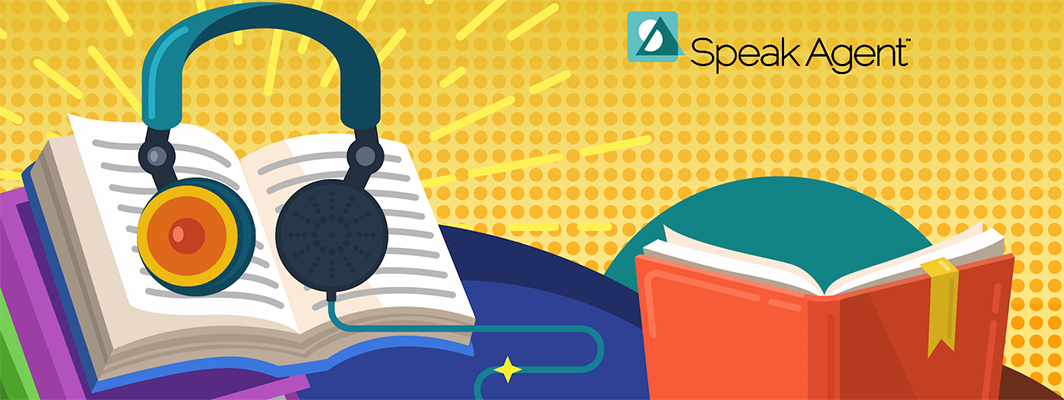
September 10, 2018 | By Ben Grimley and Susanne Nobles
To help teachers support all of their students in mastering this academic language, we at Digital Promise Global’s LVP initiative have partnered with edtech product company Speak Agent, whose goal is to ensure that each child, regardless of her or his learner variability, knows and understands academic language. We are working with Speak Agent to deepen their research-based supports for the full diversity of learners and are excited to share Speak Agent Co-Founder Ben Grimley’s story of the work his team is doing to support each student’s mastery of academic language.
Academic language includes the key academic concepts, related vocabulary, and syntax needed to navigate reading, writing, math, science, social studies, and other subjects. Research shows that a minimum of 95 percent vocabulary coverage is needed for reading comprehension, which means that unfamiliarity with academic language prevents many students from truly participating in classroom instruction. In fact, nearly two-thirds of all U.S. students fail to achieve proficient level on the NAEP reading test by eighth grade. The failure rate rises to four in five for low-income students, nine in 10 for students with diagnosed disabilities, and 19 in 20 for English language learners.
As an ELL teacher, I encountered tremendous variability in language background and level, home environment, and other factors, such as interrupted education, poverty, or undiagnosed special needs. School is not a level playing field, and this creates a yawning gap teachers are left to face as they seek to support each learner.
We created Speak Agent to empower diverse learners of all ages to more quickly and deeply master academic language. What we found in our research is that mastery requires a progression of knowledge development. It begins with students familiarizing themselves with new concepts and related vocabulary and syntax. It then progresses to developing comprehension and finally to applying the language in context. Such a progression can lead to active control of academic language.
Multimodal learning is a catalyst for this process. Too often academic language is treated as a list of definitions to be memorized, not as complex concepts to be unpacked. In our vision, “multimodal” combines traditional aural, verbal, and textual aspects of language learning (reading, writing, speaking, and listening) with visual, kinesthetic, reflective, experiential, and collaborative learning modes. These multiple modes provide the scaffolds that diverse learners need, both in guided instruction and independent practice.
By implementing proven multimodal learning strategies, students can overcome the academic language barrier. Game-based learning is one key strategy. It converts what would normally be an insurmountable challenge into a challenge that is both achievable and desirable. In the words of one teacher, “For students who are behind academically or struggle with technology … once they start playing [Speak Agent games], they get really engaged and don’t want to stop!”
It is also important for edtech solutions to have and support a growth mindset that inspires and provides room for student agency, curiosity, creativity, and exploration. In its report examining the impact of Speak Agent on science language development, Rockman reported that teachers “observed students engaging in more science content, asking questions about challenging topics, and wanting to look up additional information on their own time. Students would create their own experiments (e.g., model volcanoes) based on content introduced in Speak Agent.”
The combination of multimodal, game-based, and exploratory learning strategies creates a whole greater than the sum of its parts. It delivers better academic language outcomes by engaging students in drawing connections between curricular content and the world they experience.
These are only a few examples of strategies we will build upon in our partnership with Digital Promise Global’s LVP initiative to tackle the significant challenges at the confluence of learner variability and academic language development.
The 30 million word gap does not end after age three but continues to widen for underserved students throughout their academic careers. Our joint goal is to narrow this gap by giving educators tools that can help them meet the academic language needs of each of their students.
Together, we are working on expansion of the Speak Agent solution in several critical areas, particularly further development of a growth mindset to increase student agency and reflection and creating more opportunities for students to write to leverage the reciprocal relationship between reading and writing. Our partnership will also develop creative elements that add new dimensions to the experiential and collaborative learning modes through game-based and project-based approaches. Together, we will level up the learning experience and address a gap that is critical for success in both K-12 and lifelong learning.
To learn more about helping each student reach their fullest potential, read Learner Variability Is the Rule, Not the Exception and reach out to us at Speak Agent and LVP.
By Tamara Tate and Pati Ruiz
By Judi Fusco and Beverly Yeadon